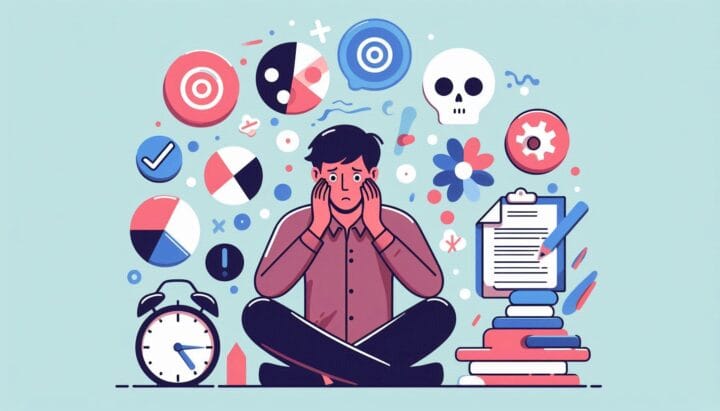OCD and Depression: Understanding the Connection
Table of Contents

OCD and Depression: When Obsessions Meet the Blues
Ever feel like your mind’s a broken record, stuck on repeat, while a dark cloud looms overhead? Welcome to the world of OCD and depression – a double whammy that can turn your brain into a battlefield. Let’s dive into this mental health maze and figure out how to find your way to clearer skies.
The OCD-Depression Tango: A Complicated Dance
OCD and depression are like that couple on the dance floor who keep stepping on each other’s toes. One leads, the other follows, and sometimes it’s hard to tell which is which. This intricate relationship can leave you feeling exhausted, frustrated, and stuck in a loop. But don’t worry, we’re about to break down this dance and teach you some new moves.
What’s OCD, Anyway?
OCD, or Obsessive-Compulsive Disorder, is like having a very pushy, very anxious roommate in your head. It’s characterized by:
- Intrusive thoughts that won’t quit (obsessions)
- Repetitive behaviors you feel compelled to do (compulsions)
- A constant need for reassurance or perfection
- Anxiety that skyrockets if you don’t follow through on compulsions
It’s like your brain’s alarm system is constantly going off, even when there’s no real danger.
Depression: The Unwelcome House Guest
Depression, on the other hand, is like a heavy blanket that smothers your joy and energy. Symptoms include:
- Persistent sadness or emptiness
- Loss of interest in activities you once enjoyed
- Changes in sleep and appetite
- Difficulty concentrating
- Feelings of worthlessness or guilt
It’s as if the color has been drained from your world, leaving everything in shades of gray.
The Vicious Cycle: How OCD and Depression Feed Each Other
When OCD and depression decide to team up, they create a feedback loop that can be tough to break. Here’s how it often plays out:
- OCD symptoms cause distress and interfere with daily life
- This leads to feelings of hopelessness and sadness
- Depression sets in, sapping energy and motivation
- Lack of energy makes it harder to resist OCD compulsions
- Giving in to compulsions reinforces OCD, making it stronger
- The cycle continues, with each condition worsening the other
It’s like being caught in a whirlpool, with each condition pulling you deeper.
Spotting the Signs: When OCD and Depression Collide
Recognizing when you’re dealing with both OCD and depression can be tricky. Here are some red flags to watch out for:
- Your OCD symptoms seem to worsen when you’re feeling down
- You feel hopeless about ever overcoming your obsessions and compulsions
- Your usual OCD rituals no longer provide relief
- You’ve lost interest in things you used to enjoy, even outside of your OCD concerns
- You’re having trouble sleeping or eating, beyond what’s typical for your OCD
If you’re nodding along to these, it might be time to reach out for professional help.
The Science Behind the Struggle
Let’s get a bit nerdy for a moment (but in a cool way, I promise). There’s actual science behind the OCD-depression connection. Studies have shown that people with OCD are ten times more likely to have depression than those without OCD [1].
But why? It turns out, both conditions involve similar brain circuits and neurotransmitters. It’s like your brain’s wiring got crossed, sending mixed signals that result in both OCD and depressive symptoms.
One study found that people with both OCD and depression had lower levels of serotonin (the “feel-good” chemical) in their brains compared to those with just OCD [2]. It’s like your brain’s happiness factory is on strike, affecting multiple areas of your mental health.
Treatment Tango: Dancing Your Way to Recovery
Alright, enough with the doom and gloom. Let’s talk solutions. Treating OCD and depression often requires a multi-pronged approach. Think of it as creating a personalized mental health playlist:
1. Cognitive Behavioral Therapy (CBT): Rewiring Your Mental Jukebox
CBT is like sending your thoughts to boot camp. It helps you:
- Identify negative thought patterns
- Challenge and reframe these thoughts
- Develop coping strategies for both OCD and depression
For OCD specifically, a type of CBT called Exposure and Response Prevention (ERP) is the gold standard. It’s like facing your fears head-on, but with a trained professional as your wingman.
2. Medication: Chemical Harmony for Your Brain
Sometimes, your brain needs a little chemical boost to get back on track. Common medications include:
- Selective Serotonin Reuptake Inhibitors (SSRIs): These can help with both OCD and depression
- Serotonin-Norepinephrine Reuptake Inhibitors (SNRIs): Another option that targets both conditions
Think of these as tuning your brain’s radio to a clearer frequency.
3. Mindfulness and Meditation: Finding Your Zen in the Chaos
Mindfulness practices can help you:
- Stay grounded in the present moment
- Reduce anxiety and depressive symptoms
- Increase self-awareness
It’s like giving your mind a mini-vacation from the OCD-depression roller coaster.
4. Lifestyle Changes: Setting the Stage for Better Mental Health
Don’t underestimate the power of:
- Regular exercise (it’s like a natural antidepressant)
- Healthy sleep habits (your brain needs its beauty sleep)
- Balanced nutrition (feed your mind as well as your body)
- Social connections (because sometimes you need a human playlist, not just a Spotify one)
Success Stories: Real People, Real Recovery
Let’s hear from some folks who’ve waltzed their way through the OCD-depression tango:
“I thought I’d never escape the constant checking and dark thoughts. But with therapy and medication, I’ve learned to turn down the volume on my OCD and brighten up my mood. It’s not perfect, but it’s so much better.” – Sarah, 28
“Meditation was a game-changer for me. It helped me step back from my obsessions and lift the fog of depression. I still have tough days, but I have tools to cope now.” – Mike, 35
These aren’t just isolated cases. Many people find significant relief and learn to manage both conditions effectively.
When to Seek Help: Don’t Go Solo on This Dance Floor
If you’re struggling with symptoms of OCD and depression, don’t try to tough it out alone. Seek professional help if:
- Your symptoms are interfering with your daily life
- You’re having thoughts of self-harm or suicide
- You’re using alcohol or drugs to cope
- Your relationships or work are suffering
Remember, asking for help is a sign of strength, not weakness. It’s like calling in a dance instructor when you’re struggling with a complicated routine.
Conclusion: Your Encore Performance Awaits
Living with OCD and depression can feel like being stuck in a never-ending dance marathon. But with the right treatment, support, and self-care, you can learn new steps and find your rhythm again.
Remember, recovery isn’t about perfection. It’s about progress. Some days you might feel like you’re doing the cha-cha, other days it might be more of a shuffle. That’s okay. What matters is that you keep moving forward.
Ready to take the first step towards a life less controlled by OCD and depression? Reach out to a mental health professional today. Your encore performance – a life with more joy and less anxiety – is waiting in the wings.
FAQs
- Can OCD cause depression, or vice versa?
It can work both ways. The stress of living with OCD can lead to depression, while depression can make OCD symptoms feel more overwhelming and harder to manage. - Are there any natural remedies that can help with both OCD and depression?
While professional treatment is crucial, some people find relief through practices like regular exercise, meditation, and maintaining a healthy sleep schedule. However, these should complement, not replace, professional care. - How long does it typically take to see improvements when treating OCD and depression together?
Treatment timelines vary for each individual. Some people notice improvements within a few weeks, while for others it might take several months. Consistency and patience are key. - Can children have both OCD and depression?
Yes, children can experience both OCD and depression. If you notice persistent signs of either condition in a child, it’s important to consult with a pediatric mental health professional. - Is it possible to completely cure OCD and depression?
While “cure” might not be the right word, many people learn to manage their symptoms effectively and lead fulfilling lives. Treatment often focuses on long-term management and coping strategies rather than a one-time fix.














Post Comment